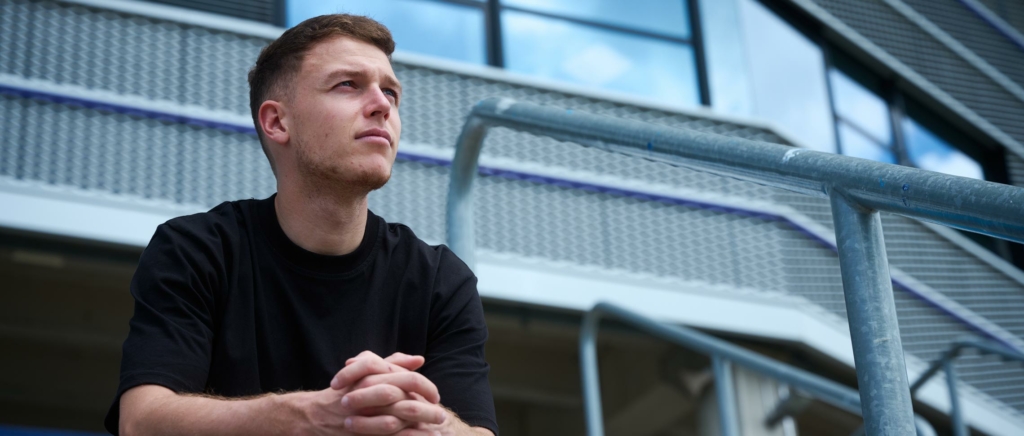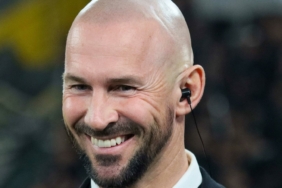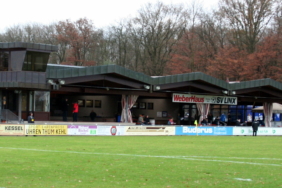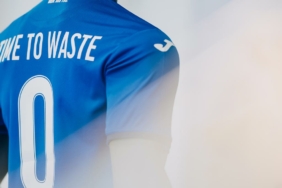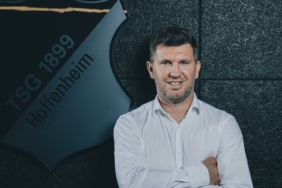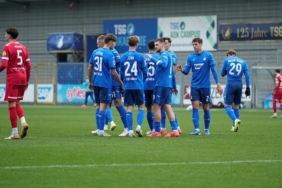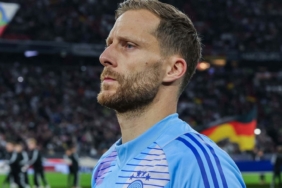Dennis, after a difficult season you managed to stay up on Matchday 33. What was the mood like afterwards?
“A lot of pressure was off our shoulders. Whether staff, fans or players, everyone was just relieved after the 4-2 win against Union Berlin. Since only we players could make it happen, we in particular felt huge pressure. It was a nice feeling to secure our place in the division. But nobody wants to be in a situation like that again. It took up a hell of a lot of energy.”
How did you deal with the pressure in your everyday life?
“I tried to get away from football in my free time, to talk or think about other things and not to watch every match. But of course, it’s not easy when a direct rival is playing. When Schalke were playing in Mainz on a Friday for example, I didn’t want to watch the match but then I was checking the score every five minutes and ended up turning the TV on at some point after the 60th minute. And honestly: when Schalke scored a penalty in stoppage time to win, the night was anything but pleasant. Because you simply knew: okay, we simply have to win tomorrow against Eintracht Frankfurt. Otherwise, it will get even tighter.”
Was the Frankfurt game the most challenging situation of the season?
“It certainly was for me. We were of course in last place before the game against Hertha BSC in mid-March, but we knew at the time that there were still many games left. But if we’d lost against Frankfurt, it could’ve gotten really bad. After that there were only three games to go, two of which were away. There was a crazy amount of pressure on us. But we held firm and produced our best performance when it mattered the most. I have to pay the team a huge compliment: we won every game that we had to win in the home stretch of the season.”
Nevertheless, TSG Hoffenheim do not aspire to only take the decisive step towards staying up with one round of matches remaining. What season objectives do you envisage for TSG in the future?
“I didn’t extend my contract here to battle relegation each season. That is neither my nor TSG Hoffenheim’s ambition. However, we must move away from the notion that we can play in the Europa League or the Champions League each year. We don’t have this strength as a club and as a team. There are simply different calibres in the league. It bothers me a bit that many people think we have to qualify for Europe every year. If we have a good season and everything goes right, then we can set our sights on the international spots. But in a normal season, 10th position is more realistic than fifth or sixth. We of course don’t want to be battling relegation until the end, but it is also still an achievement when you still manage to stay up in such a difficult season.”
How important is it to convey this expectation externally?
“The public perception is hugely important. The three participations in Europe across 15 years in the Bundesliga were wonderful exceptions, but they cannot be the lasting expectation. Everything was simply right at that time. Coach, team, environment – everything was perfect. You can’t expect that every season and you can’t repeat it at will. In retrospect, TSG Hoffenheim had two exceptional phases. They were the winter championship under Ralf Rangnick and the Champions League qualification under Julian Nagelsmann. But even in these phases, we finished 11th and 9th, we were mostly in a comfortable mid-table position and at times we, as TSG Hoffenheim, battled relegation. One must always be aware of that.”
Regardless of the position in the table, what do you want to see happen in the future?
“I see great footballing potential in the team. That was not required anymore in the closing stages of the season; other things matter in a relegation battle. But the training sessions under Rino (editor’s note: coach Pellegrino Matarazzo) give me a good feeling that we’re taking another step forward. And in a way, this season will help us in the future. We’ve also learned to play dirtier and to fight back. You can’t just play nice football, that’s not how you win. The club wants to keep training many young players. Next season, some of our good youngsters will take the next step and make more appearances. That’s what the fans want to see too. I’m looking forward to leading the way and helping the boys. This season has bonded us even more as a team; in the final games of the season, you could sense the positive energy coming off the bench.”
You yourself also lead the way on the pitch and sometimes get the spectators going with passionate challenges or emotions…
“That’s part of my playing style, even though I maybe overdid it a bit in the important games. But I need that to get to my level, to release that energy. By doing so I can send a direct message to gee up the team and the fans. An action like that can ensure that we are really ready from the first minute. When you’re pushed on the pitch by your team-mates, it feels good for everyone.”
You picked up nine yellow cards this season but avoided a suspension in the last matches.
“That’s part of the maturing process. I’ve not only gotten older but also more experienced. It was in my head the entire time that I would be unavailable if I got another caution. That’s why I held myself back slightly in the final five games. I knew that I was needed, I didn’t want to get a stupid booking for moaning, kicking the ball away or something like that. It is my ambition to lead the way. I want to give the team what they need from me and what they expect from me. The most important thing in that regard is that I’m on the pitch, that has often not been the case in the past. I don’t want to let the team down, you can’t allow yourself an unnecessary suspension.”
“As a young player I didn’t know how important that was. You think: I’m 18, 19 years old: What am I going to stretch here or go to the weight room for? What does that serve? That’s also part of the maturing process. I had to learn it the hard way, but that’s how it is in life sometimes.”
In the past you have often had to watch on injured, but this season you stayed free of major injuries…
“I finally played through a season without a major injury. Although I missed seven games, one was because of a suspension and the others were just minor problems or I was ill. I’ve never played so many games in a season in my professional career. That’s incredibly good for me.”
Did you do something special to achieve that?
“I underwent surgery on my thigh, which was the best decision of my life. Otherwise, I might not have continued. There was so much that was broken and had never healed properly. Even when I played, I always had problems after my first injury. After the operation, I finally had confidence in my body again. But of course I now invest more in my body. Training after training is simply part of it now. As a young player, I didn’t know how important that was. You think: I’m 18, 19 years old: What am I going to stretch here or go to the weight room for? What does that serve? That’s also part of a maturing process. I had to learn it the hard way, but that’s how it is in life sometimes.”
Prior to your injury, you played for the Germany U21s. Do you still think about the topic of the national team?
“I don’t invest any energy in it. It used to be different, but I’ve changed my thinking. I’m mega-ambitious, but I was injured for two years straight – that keeps you grounded. I appreciate what I get to experience here every day. To be on the pitch with the guys and not be in rehab anymore is a great feeling. I didn’t know how I was going to come back either. Enough people predicted that I had lost the two most important years of my career and asked whether I’d come back at all. So I’m just happy to be on the pitch. Even though I always strive for the maximum.”
You’ve extended your contract with TSG by four years, what made you decide to sign long-term with Hoffenheim?
“It was clear from the beginning that I was not going to sign for one or two years. I knew there wouldn’t be a situation like that again: being 25, the peak age for a footballer, and able to move on a free transfer after an almost injury-free season. That does of course appeal, it would have been the moment to do something different. I gave it a lot of thought; on some days, I even fretted about it. In the end, I had to choose between two different offers and it also wasn’t easy for me, but I listened to my heart and chose Hoffenheim out of conviction. A few weeks later, I can say that it was the right choice.”
You signed in the thick of the relegation battle…
“I of course wanted to make a statement by doing so. I could’ve certainly earned more money at other clubs, but for me it’s more important that I feel comfortable and am happy. And that’s 100% the case in Hoffenheim. I feel the appreciation here, especially after all the years in which it was more difficult due to injuries. Here I simply know what I have at the club and what I have in the team. I’m sure the coach also played a role, because Rino also fought to keep me. I realised this season – no matter how bad things got – what a good spirit we have in the team, what a great squad we have. In the end, it was just a bit of a gut feeling. I thought that I would feel the most comfortable here in the next few years. I made the decision at a time when it was unclear whether we would play in the first division or the second division. There can’t really be a clearer commitment.”

Jetzt 11 Ausgaben kostenlos* abonnieren!
(*jahrliche Bezugskosten nur 18,99 €)

